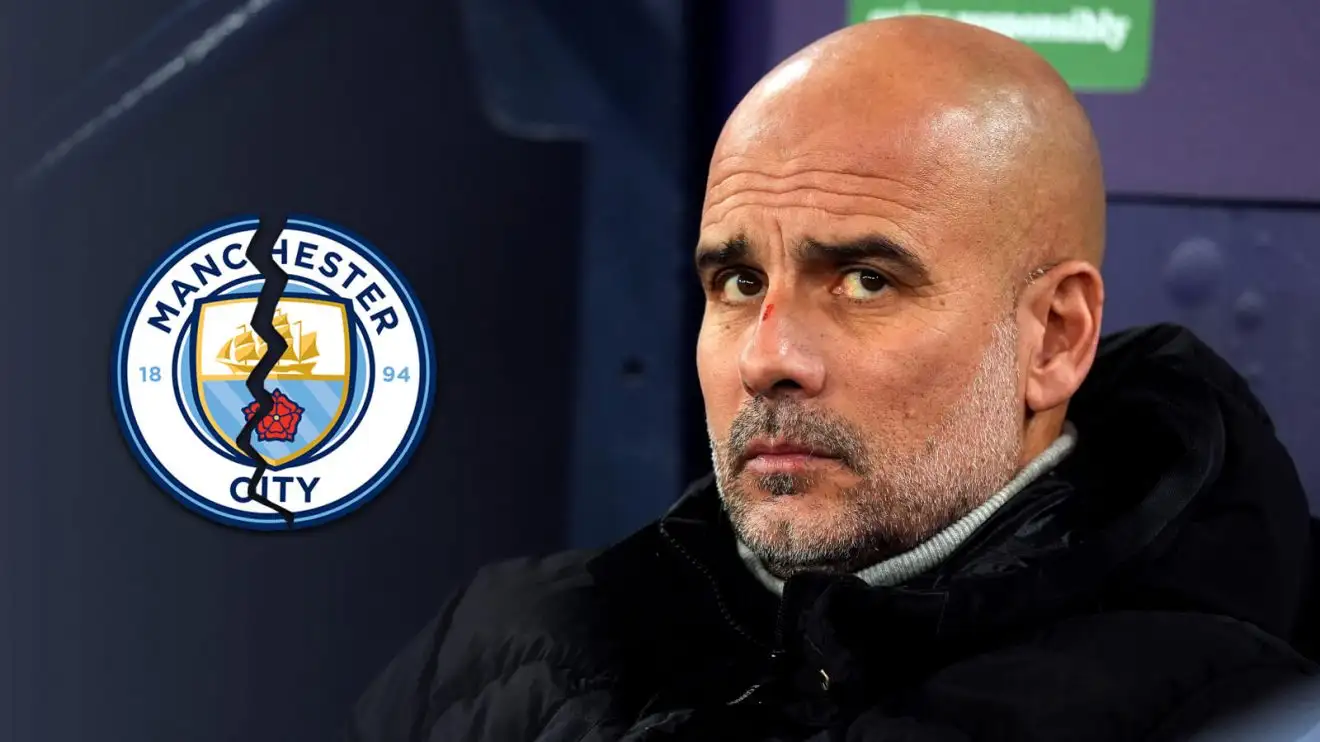
Manchester City fans are growing increasingly anxious as their team faces an unexpected crisis, marked by disappointing performances, key injuries, and growing speculation about manager Pep Guardiola’s mental state. The “alarm bells are ringing” loudly, especially after a shocking comeback draw against Feyenoord in the Champions League, which followed five consecutive defeats, including a 4-0 thrashing by Tottenham. These events have led to questions about the team’s confidence, resilience, and even Guardiola’s psychological well-being.
The Collapse Against Feyenoord: A Symbol of Deeper Problems
The recent 3-3 draw against Feyenoord at the Etihad Stadium was emblematic of Manchester City’s broader struggles this season. City had a comfortable 3-0 lead but allowed their opponents to claw their way back into the match, exposing glaring defensive frailties. This result came just days after a humiliating 4-0 loss to Tottenham, further amplifying concerns about the team’s form and morale. Such collapses are rare for a team that has dominated English and European football in recent years, raising questions about whether City’s golden era under Guardiola is coming to an end.
Former Manchester United chief scout Mick Brown has pointed to injuries as a significant factor in City’s downturn. Key players such as Rodri, Kevin De Bruyne, John Stones, and Ruben Dias have missed a combined 32 games this season, leaving the squad stretched thin. “There are lots of marginal issues that end up building into a bigger problem,” Brown told Football Insider. “In my judgement, that’s the biggest issue at Man City at the moment.”
The Impact of Key Injuries
The absence of world-class talents has had a cascading effect on the entire team. De Bruyne’s creativity, Stones’ defensive solidity, Dias’ leadership, and Rodri’s midfield control are all irreplaceable assets. Brown emphasized that no team, not even one as deep as Manchester City, can lose four of its best players and maintain the same level of performance. “If you think any team is good enough to lose four of their best players and be as good as they were before, then I don’t know what to say,” he remarked.
Beyond the tangible impact on the pitch, these injuries have also eroded the team’s confidence. “When balls used to go past players, they knew they had their teammates behind them to deal with it,” Brown explained. “All of a sudden, these aren’t being dealt with quite so effectively. Then everybody starts to panic.” This collective anxiety has led to a downward spiral, where each mistake compounds the pressure, and the team struggles to regain composure.
Guardiola’s Mental State: A Cause for Concern?
Adding to the drama, Guardiola’s behavior during and after the Feyenoord match has sparked widespread concern. The Spanish manager was seen clawing at his head and face, and later appeared on camera with visible scratches and a bloody nose. While Guardiola dismissed the incident with a humorous remark about a “long nail,” the images painted a troubling picture of a man under immense pressure.
In response to the growing speculation, Mundo Deportivo enlisted the expertise of Enric Armengou, a professor of psychiatry at Abat CEU University in Barcelona. Armengou offered a more measured perspective, suggesting that Guardiola’s behavior, while intense, was not necessarily indicative of a deeper psychological issue. “What happened with Guardiola speaks of the level of anxiety he has, but it is a specific event in moments of maximum tension,” he explained. “His behavior was that of a man who is at his limit and regulated himself by hurting himself. Others might throw their notebook against the bench or kick a bottle.”
Armengou emphasized that such outbursts are not uncommon in high-pressure environments and should not be overinterpreted. “We should not give the matter greater significance because it was a moment of anger, which has no signs, due to the known antecedents, that it is a trend,” he said. According to the professor, Guardiola’s intensity on the sidelines is well-known, and this incident does not suggest a loss of control or mental stability.
The Road Ahead: Challenges and Uncertainty
Despite these reassurances, the pressure on Guardiola and his team is undeniable. City’s recent performances have exposed vulnerabilities that opponents are eager to exploit. The defensive lapses, lack of cohesion, and diminishing confidence are issues that need urgent addressing. With key players still recovering from injuries, Guardiola faces the daunting task of rebuilding his team’s morale and restoring their winning mentality.
The coming weeks will be crucial for Manchester City. They need to not only secure positive results but also demonstrate the resilience and dominance that have characterized their play in recent years. Guardiola’s ability to navigate this crisis will be a defining moment in his tenure. If he can steer the team through these turbulent waters, it will only add to his legacy. However, if the downward spiral continues, the whispers about his mental state and the team’s decline will only grow louder.
Conclusion: A Test of Character
Manchester City’s current predicament is a stark reminder of the fine margins that define success and failure in elite football. Injuries, loss of confidence, and psychological pressure have combined to create a perfect storm. While alarm bells are ringing, it is too early to write off Guardiola and his team. They have faced adversity before and emerged stronger. Whether they can do so again remains to be seen, but one thing is certain: the world will be watching closely.
Leave a Reply